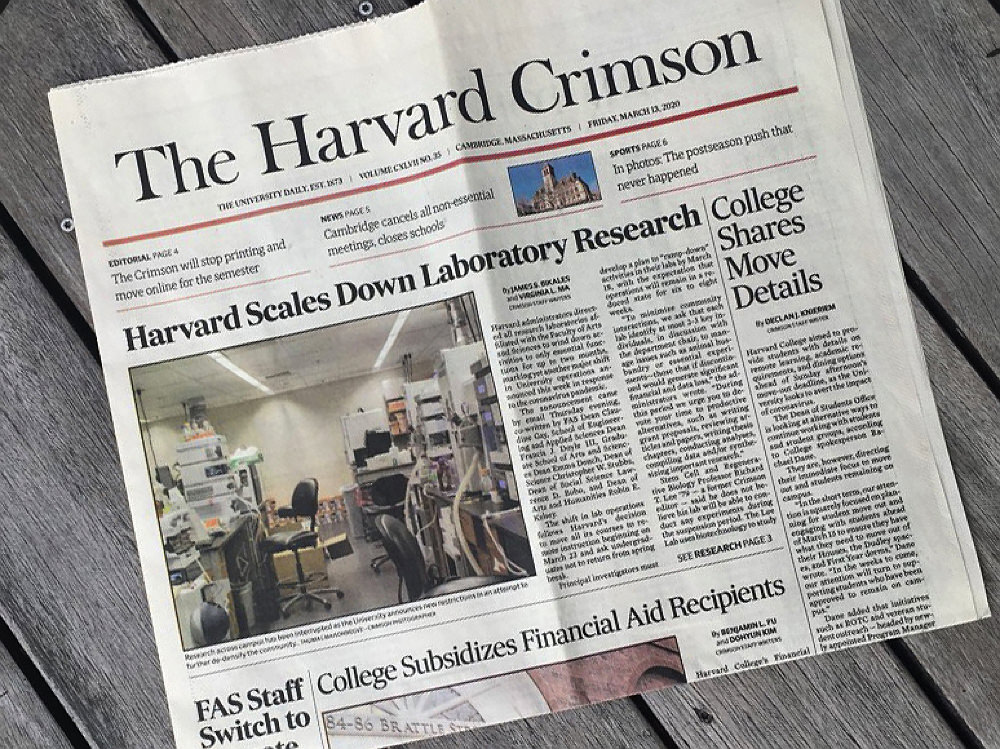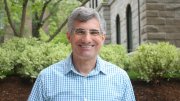Racial Justice in FAS
Following the appointment of the University’s chief diversity and inclusion officer (Brevia, September-October, page 21), Faculty of Arts and Sciences dean Claudine Gay announced in August that despite hiring constraints, she would reactivate searches for four faculty appointments in ethnicity, indigeneity, and migration, complemented by a visiting professorship in the field; double the number of postdoctoral fellows for the Inequality in America initiative; and create an associate deanship of diversity, inclusion, and belonging. (Read a full report at harvardmag.com/racialjustice-steps-20). Shortly thereafter, she named Sheree Ohen (above) the new associate dean. An attorney with experience in civil-rights and employment law, Ohen was most recently chief diversity and inclusion officer at Clark University (see harvardmag.com/diversity-dean-20). Gay also initiated a study of hiring, professional development, and promotion among FAS managerial and executive staff, to be led by Ohen, aiming to “increase racial diversity of senior staff,” and a review of visual culture on campus, led by dean of arts and humanities Robin Kelsey.
“Anti-Racism” in Athletics
Nichols director of athletics Erin McDermott announced in August a diversity, inclusion, and belonging task force “committed to advancing an anti-racist culture within Crimson Athletics” and beyond. Its subcommittees will examine support for students, coaches, and staff; education; recruiting; hiring; and civic engagement.
“Lowell” House?
Lowell House faculty deans David Laibson and Nina Zipser have invited their community to discuss the House name, given its connections to “Abbott Lawrence Lowell, who once led the University (1909-33) and is remembered for his racism, anti-semitism, purges of gay students, sexism, and xenophobia.” Last year, as the House was about to reopen after renovation, they announced the decision to move certain portraits, including that of Abbott Lawrence Lowell (see harvardmag.com/lowellportrait-19). Now, they are talking about “the arguments for and against changing the name” and possible alternatives—including Amy Lowell (“after the Pulitzer Prize winning poet, who lived with her gay partner at the same time that her brother purged gay members from the Harvard community”), W.E.B. Du Bois, A.B. 1890, Ph.D. ’95, and Cecilia Payne-Gaposchkin (“after the path-breaking astronomer whose own path to tenure was initially blocked by Abbott Lawrence Lowell”). For details, see harvardmag.com/lowell-name-debate-20.
HMC Diversity
In a July 31 response to queries about asset-manager diversity from members of the U.S. House of Representatives, Harvard Management Company CEO N.P. Narvekar and chief compliance officer Kathryn I. Murtagh wrote that although HMC has posted a general statement about diversity and inclusion, it is crafting “a more detailed equal-opportunity statement pertaining to the selection of endowment managers,” and that it has retained an outside provider to introduce HMC to “more women- and minority-owned asset managers, with a particular emphasis on people of color historically under-represented in the investment sector (defined as African American/Black, Latinx, and Native American/Pacific Islander).” By HMC’s calculation, “majority diverse” firms account for 27 percent of its active relationships with external fund managers, and 26 percent of assets invested by active external managers.
Loeb Lifeline
The trustees of the Loeb Classical Library Foundation—which publishes the eponymous standard editions of classical texts with Harvard University Press, in print and online (see “Loeb Classical Library 1.0,” September-October 2014, page 22), have created four two-year postdoctoral fellowships in the classics for 2021-2023. Their aim, the trustees made explicit, is to counter “the current economic downturn and uncertainties about the immediate future of higher education,” which “pose a particular challenge for the newest members of the teaching/research profession.” That challenge is especially acute across the humanities, and especially in such fields as the classics. Lane professor of the classics Richard Thomas, who initiated the fellowships with the support of his fellow trustees, said he hopes to extend the support in future years, because “the critical situation in entry-level hiring” is likely to persist.
Nobel Farewell
Gates professor of developing societies Michael Kremer ’85, Ph.D. ’92, who shared the 2019 Sveriges Riksbank Prize in Economic Sciences in Memory of Alfred Nobel with two MIT colleagues for work on economic development and alleviating global poverty, has departed for the University of Chicago. He will be a University Professor, with appointments in economics and the Harris School of Public Policy, and will direct a new Development Innovation Lab (see harvardmag.com/kremer-departs-20). Such departures are not unprecedented, but Kremer’s move—so soon after his Nobel, and given his long Cambridge ties—stings; Harvard apparently tried hard to retain him. In an era of constrained resources, bidding for such talent merits close watching.

Photograph by Harvard Magazine/JC
Paper Plans?
In a note to readers on September 2 (the first day of fall classes), The Harvard Crimson’s president, Aidan F. Ryan ’21, and managing editor, Shera S. Avi-Yonah ’21, wrote that in mid March, as the pandemic spread and campus was depopulated, “[W]e decided to suspend our print paper with the hope that Harvard students—including The Crimson’s staff—would safely return to Cambridge for the fall semester. That did not happen,” and so “we have decided to continue online-only production for the time being.” In case that time being turns out to be permanent, herewith a photo of the last issue delivered to this magazine’s offices, and left in place on the reception table for the ensuing months through this past summer.
Research Roundup
The National Science Foundation has committed $20 million over five years to an artificial-intelligence institute focusing on fundamental physics and involving 27 scientists from Harvard, MIT, Northeastern, and Tufts. Cora Dvorkin, associate professor of physics, is Harvard’s representative on the institute’s board—one of eight University scholars involved. The institute is part of a larger, $100-million program on AI research and applications to scientific disciplines, led overall by Jesse Thaler, Ph.D. ’06, associate professor of physics at MIT.…Separately, the U.S. Department of Energy is creating five quantum information science research centers affiliated with the national laboratories (Argonne, Brookhaven, Fermi, Oak Ridge, and Lawrence Berkeley), a $625-million, five-year component of the national quantum initiative. Among many Harvard participants, Leverett professor of physics Mikhail Lukin, co-director of the Harvard Quantum Initiative (see harvardmag.com/2018/11/quantum-sci-18), is project leader at one of the Berkeley lab programs. Yale’s Higgins professor of physics Steven Girvin will split his time between New Haven and Brookhaven, directing the $115-million Co-design Center for Quantum Advantage based there.
Title IX Regs Revised
To comply with new federal regulations governing claims of sexual harassment (including assault) and other sexual misconduct, the University on August 14 adopted two new interim policies (detailed at titleix.harvard.edu/policies-procedures). The interim sexual-harassment policy requires formal complaints to proceed to a live hearing with the ability of the parties to cross-examine one another. The interim other-sexual-misconduct policy does not adopt the new hearing mechanism. Both policies maintain the “preponderance of evidence” standard for deciding formal cases. The University, and many other schools, opposed the new federal guidance; in conveying the interim policies to the community, President Lawrence S. Bacow wrote: “Harvard remains committed to fostering a safe environment in which all of us can do our best work. Despite changes we have been compelled to make…the University will…continue to address the same level of conduct that was addressed under our prior policy.”
Nota Bene
Breakthrough biologist. Catherine Dulac, Lee and Ezpeleta professor of arts and sciences and Higgins professor of molecular and cellular biology, has been awarded the $3-million Breakthrough Prize in Life Sciences for 2021, for her work on the neural circuitry that governs parenting behavior. “The Mr. Mom Switch” (May-June 2015, page 11) describes some of her discoveries in behavioral biology.
Retiree roster. David P. Davidson, managing director of Harvard University Dining Services (see Harvard Portrait, May-June 2018, page 17), has announced his retirement, effective December 31. He has promoted a sustainable supply chain for ingredients (“Eating Greener,” July-August 2019, page 22)—a recent highlight during a nearly 25-year Harvard career in two separate stints.…Also retiring: Margot Gill, Faculty of Arts and Sciences administrative dean for international affairs and, of late, University Marshal; and, in October, Robert Gogan, associate manager of recycling services, who probably did more to green Harvard than anyone else for three decades, while meticulously documenting campus enthusiasts’ Nature Watch observations.
Anthropologist allegations. In the wake of anthropology professor Gary Urton’s retirement following allegations of sexual harassment (Brevia, September-October, page 22), FAS dean Claudine Gay announced in late August that Foster professor of African and African American studies and of anthropology John Comaroff had been placed on paid administrative leave, pending a full review of allegations of sexual harassment and retaliation against students.
Miscellany. The National Science Foundation has conferred its Waterman Award—its most prestigious recognition for scientists under the age of 40, which comes with $1 million for research funding over five years—on Emily P. Balskus, professor of chemistry and chemical biology, who studies microbes and their interaction with the human body. She is the sixth Harvard scientist, and first Harvard woman, to be so honored since the award was created in 1975..…The Poetry in America program, through which Cabot professor of American literature Elisa New develops online poetry-education materials (“Harvard Credit for High-Schoolers,” March-April 2020, page 20), has received a National Endowment for the Humanities “A More Perfect Union” grant, supporting civic education leading up to the country’s 250th anniversary in 2026. The grant will support five of eight episodes in the poetry program’s third season.









